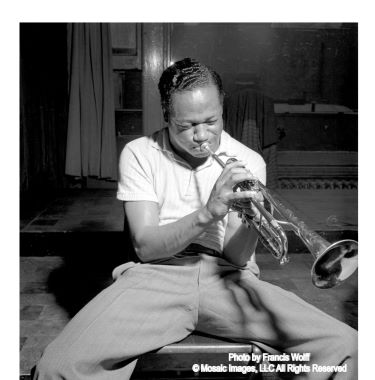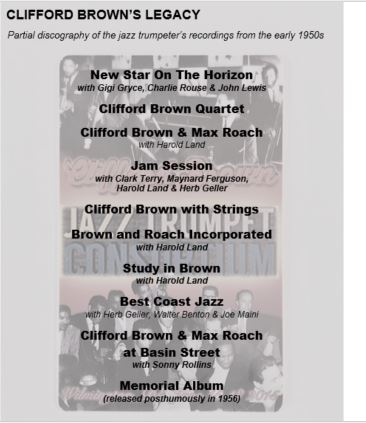
‘50s jazz icon studied briefly at Maryland State College
Wednesday, June 3, 2020
A single-car accident in Princess Anne in the pre-dawn hours of Saturday, June 3, 1950, killed two young adults and left six others injured.
One of the survivors was Clifford Brown of Wilmington, Del., who had just finished his first semester as a student at then-Maryland State College.
A front-page article published in the Salisbury Times the day of the accident reported the freshman suffered a broken leg. Subsequent accounts characterized his injuries as far more serious – so much so he withdrew from school.
Brown, however, had a rare gift to fall back on. He was a jazz prodigy who blossomed into a prolific recording artist, performing in the same circles as Fats Navarro, Lionel Hampton and Dizzy Gillespie.
Gillespie had seen Brown in the summer of 1949 play trumpet in Philadelphia and paid him a get-well visit after the automobile accident. Gillespie reportedly encouraged Brown to forego college and focus instead on becoming a professional musician.
Dizzy knew talent when he heard it; Brown proved to be a bona fide star.
A 1948 graduate of Wilmington’s Howard High, a National Historic Landmark for its significance in the U.S. Supreme Court ruling that ended school segregation, Brown waited a year before enrolling at then-Delaware State College in Dover.
Delaware’s state capital was geographically close enough to Wilmington and Philadelphia so Brown could continue to observe and play the jazz scenes where he already was a familiar presence.

Maryland State, a land-grant institution led by President John Taylor Williams, was in the early stages of forging a reputation for nurturing musicians. Delaware State lost its accreditation as a higher education institution in November 1949 — Brown’s first semester in college — and he switched schools.
The 19-year-old emerged as a leader of the 14-piece Maryland State Collegians with a flair for creative set arrangements, a combination that made the band from Princess Anne an in-demand act.
Maryland State didn’t publish its first yearbook until 1959, so no images of Brown as a student are known to exist. A transcript in the registrar’s archives confirms that he studied music in the spring 1950 after transferring from Delaware State, where he had been a math major.
It took Brown a year to recuperate from his injuries. By 1952, he was getting invitations from influential musicians eager to have him play on their recordings.
Brown’s career took off over the next four years. He performed with such luminaries as Charlie Parker, Quincy Jones and Gigi Gryce, and appeared on albums with vocalists Sarah Vaughan and Dinah Washington.
Original Brown compositions “Daahoud”, “Sandu” and “Joy Spring” – the latter inspired by his wife, Larue – are jazz classics.
Jazz aficionados generally agree Brown’s best recordings were with drummer Max Roach, a pairing credited with popularizing “hard bop.”
Gerry Weston, station manager of WESM on the University of Maryland Eastern Shore campus that features a jazz format, said Roach comes to mind immediately when Brown’s name is mentioned. He called their group one of “jazz’s legendary bands.”
Six years after the horrific accident at Memorial Bridge near Princess Anne’s historic Manokin Presbyterian Church, Brown died in another single-vehicle crash on the Pennsylvania Turnpike en route to a gig in Chicago. Pianist Richie Powell and his wife Nancy, who was driving, also were killed.
A coroner’s report says the fatal mishap occurred around 1:15 a.m., Saturday, June 27, 1956, according to educator Don Glanden, who spent two decades doing research for “Brownie Speaks,” a documentary film he produced. Clifford Benjamin Brown was 25.
An “influential, sweet-toned trumpeter … who died way too young,” said Angel Resto Jr., one of WESM’s on-air personalities.
Brown’s death shocked his fans and peers. Saxophonist Benny Golson was moved to compose “I Remember Clifford,” a tribute considered a jazz standard.
Brown’s hometown, Wilmington, Del., has held an annual music festival in his honor since 1989.
According to a police report that was the source of the Salisbury Times’ June 3, 1950 article, Samuel Turner, who also played trumpet, and pianist Wanda Shevenry were identified as Maryland State students from Chicago who suffered fatal injuries in the automobile accident.

